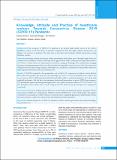Please use this identifier to cite or link to this item:
https://hdl.handle.net/20.500.14356/1294Full metadata record
| DC Field | Value | Language |
|---|---|---|
| dc.contributor.author | Ghimire, Prabina | - |
| dc.contributor.author | Dhungel, Samriddh | - |
| dc.contributor.author | Pokhrel, Anil | - |
| dc.date.accessioned | 2023-05-04T09:49:31Z | - |
| dc.date.available | 2023-05-04T09:49:31Z | - |
| dc.date.issued | 2020 | - |
| dc.identifier.citation | GhimireP., DhungelS., & PokhrelA. (2020). Knowledge, Attitude and Practice of healthcare workers Towards Coronavirus Disease 2019 (COVID-19) Pandemic. Journal of Nepal Health Research Council, 18(2), 293-300. https://doi.org/10.33314/jnhrc.v18i2.2658 | en_US |
| dc.identifier.issn | Print ISSN: 1727-5482; Online ISSN: 1999-6217 | - |
| dc.identifier.uri | http://103.69.126.140:8080/handle/20.500.14356/1294 | - |
| dc.description | Original Article | en_US |
| dc.description.abstract | Abstract Background: The emergence of SARS-CoV 2 pandemic is the greatest public health concern of the century. Healthcare workers are the front liners of pandemic management. Their knowledge, attitudes and practices can influence the outcome of pandemic. The study aims to determine the knowledge, attitude and practices among healthcare workers. Methods: Knowledge, attitude and practice related questionnaire based online survey through Google forms was conducted from Healthcare workers, following ethical approval from NHRC (ERB protocol registration number: 297/2020 P). Online forms were disseminated via Facebook, Instagram, Whatsapp, Viber and personal messaging. Responses containing anonymized data was collected analyzed in using SPSS-version 26, (Year: 2019). The results were interpreted in terms of percentage response, knowledge score, and practice and discussed on the possible solutions in improving the infection prevention and control practice. Results: 473 HCWs responded to the questionnaire, out of which 426 responses met inclusion criteria which is 90% of the total responses. The mean score for knowledge was 3.20 + 1.15 out of maximum seven; with 45.7% correct answers. 70.4 % (300) participants felt that Nepal will be unable to contain the pandemic, 64 % of the total employed participants felt that there was inadequate institutional preparedness to protect HCWs from exposure. 91% participants reported practicing hand hygiene after every patient encounter; whereas 31.7% (77) and 22.1% (59) participants did not know how to check sealing of the N95 masks and use personal protective equipment’s respectively. Conclusions: The survey findings showed deficiencies in knowledge and appropriate practice among the HCWs, in prevention of SARS-CoV-2 transmission. Attitudes towards COVID19 were a mix of both positive and negative viewpoints. Even in health care workers with access to internet, there is significant gap in universal infection prevention and control practices required for self-protection and limiting untoward transmission. Keywords: Attitude and practice; COVID-19; healthcare workers; infection prevention and control; knowledge, Nepal; SARS CoV 2 | en_US |
| dc.language.iso | en | en_US |
| dc.publisher | Nepal Health Research Council | en_US |
| dc.relation.ispartofseries | Apr-June, 2020;2658 | - |
| dc.subject | Attitude and practice | en_US |
| dc.subject | COVID-19 | en_US |
| dc.subject | healthcare workers | en_US |
| dc.subject | infection prevention and control | en_US |
| dc.subject | knowledge | en_US |
| dc.subject | Nepal | en_US |
| dc.subject | SARS CoV 2 | en_US |
| dc.title | Knowledge, Attitude and Practice of healthcare workers Towards Coronavirus Disease 2019 (COVID-19) Pandemic | en_US |
| dc.type | Journal Article | en_US |
| local.journal.category | Original Article | - |
| Appears in Collections: | Vol. 18 No. 2 Issue 47 Apr-Jun 2020 | |
Files in This Item:
| File | Description | Size | Format | |
|---|---|---|---|---|
| 2658-Manuscript-17535-1-10-20200911.pdf | Fulltext Download | 229.85 kB | Adobe PDF |  View/Open |
Items in DSpace are protected by copyright, with all rights reserved, unless otherwise indicated.
